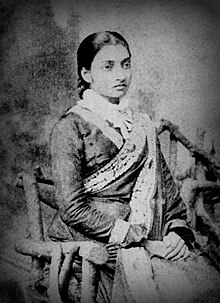Jnanadanandini Devi
| Jnanadanandini Tagore | |
|---|---|
| Born | July 26, 1850 Narendrapur, Jessore district, Bengal presidency |
| Died | October 1, 1941 (aged 91) |
| Occupation | social reformer |
| Spouse(s) | Satyendranath Tagore |
Jnanadanandini Tagore (née Mukhopadhyay; 26 July 1850 – 1 October 1941) (Bengali: জ্ঞানদানন্দিনী দেবী, Gyanodanondinee Debi) was a social reformer who pioneered various cultural innovations and influenced the earliest phase of women's empowerment in 19th century Bengal. She was married to Satyendranath Tagore, a scion of the Jorasanko Tagore Family.
Jnanadanandini was born to parents Abhaycharan Mukhopadhyay and Nistarini Devi of Narendrapur village in Jessore, Bengal Presidency. Abhaycharan, a Kulin Brahmin, became an out-caste by marrying into a Pirali family and was disinherited by his father. In accordance to the prevalent custom, Jnanadanandini was married at the young age of seven or eight to Debendranath Tagore's second son, Satyendranath in 1857. In contrast to her idyllic life in Jessore, she found herself confined behind the strict purdah of the Tagore household at Jorasanko. In 1862, while pursuing his probationary training for the Indian Civil Service (ICS), Satyendranath asked for Jnanadanandini to join him in England. This request, made to his father Debendranath Tagore was however turned down by the latter. Around this time, Jnanadanandini's brother-in-law Hemendranath Tagore took charge of her education. She was also tutored briefly by the famous Brahmo educationist Ayodhyanath Pakrashi. Upon Satyendranath's return from England in 1864 as the first Indian member of the Civil Service, Jnanadanandini went to live with her husband in Bombay.
...
Wikipedia

